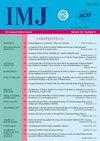环蛋白依赖性激酶4/6抑制剂联合芳香化酶抑制剂治疗转移性乳腺癌(临床观察)
Q4 Medicine
引用次数: 0
摘要
众所周知,广泛性肿瘤患者完全康复是不可能的,但使用有效的治疗方案可以显著抑制疾病的发展。转移性乳腺癌治疗的主要目标是增加总生存期、疾病进展时间、改善生活质量、预防严重并发症。近年来,绝经后患者的一线激素治疗标准是使用芳香化酶抑制剂。最近,一类新的药物已经出现,可以提高激素治疗的有效性,这大大加强了这种方法在转移性乳腺癌中的地位。PALOMA - 2的一项临床试验及其研究结果表明:与来曲唑单药治疗相比,帕博西尼+来曲唑方案作为绝经后雌激素阳性Her2新阴性晚期乳腺癌患者的一线治疗可提高客观有效率和临床疗效。与安慰剂+来曲唑相比,帕博西尼+来曲唑治疗的患者总体不良反应发生率更高。本临床病例证明了转移性乳腺癌长期有效控制疾病的可能性。文献资料和个人经验表明,激素治疗和细胞周期蛋白依赖性激酶抑制剂联合治疗方案的疗效很高4/6。在多发骨转移患者中使用这种方案是可取的,同时可以有效地减轻疼痛。ECOG评分低且不能耐受毒性更大的化疗的患者可以使用这种方案。关键词:转移性乳腺癌,芳香化酶抑制剂,帕博西尼。本文章由计算机程序翻译,如有差异,请以英文原文为准。
CYCLIN-EPENDENT KINASES 4/6 INHIBITORS IN COMBINATION WITH AROMATASE INHIBITORS IN TREATMENT OF METASTATIC BREAST CANCER (clinical observation)
It is known that a complete recovery in patients with generalized tumor is impossible, but the use of effective treatment regimens can significantly inhibit the development of the disease. The main goal of treatment of metastatic breast cancer is to increase overall survival, time to disease progression, improvethe quality of life, to prevent serious complications. In recent years, the standard of first−line hormone therapy in postmenopausal patients has been the use of aromatase inhibitors. Recently, a new class of drugs has emerged that can increase the effectiveness of hormone therapy, which significantly strengthens the position of this method in metastatic breast cancer. A clinical trial of PALOMA−2 and its findings are presented: the palbociclib + letrozole protocol as first−line therapy in postmenopausal patients with estrogen−positive Her2 new negative advanced breast cancer improves the objective response rate and clinical efficacy compared to letrozole monotherapy. The overall incidence of adverse responses was higher in patients treated with palbociclib + letrozole compared with placebo + letrozole. This clinical case demonstrates the possibility of long−term effective disease control in metastatic breast cancer. Literature data and personal experience show high efficacy of the combined protocol of hormone therapy and inhibitors of cyclin−dependent kinases 4/6. The use of such protocols is advisable in patients with multiple bone metastases, while achieving an effective reduction of pain. The use of such regimens is possible in patients with a low ECOG score who cannot tolerate chemotherapy with more severe toxicity.
Key words: metastatic breast cancer, aromatase inhibitors, palbociclib.
求助全文
通过发布文献求助,成功后即可免费获取论文全文。
去求助
来源期刊

International Medical Journal
医学-医学:内科
自引率
0.00%
发文量
21
审稿时长
4-8 weeks
期刊介绍:
The International Medical Journal is intended to provide a multidisciplinary forum for the exchange of ideas and information among professionals concerned with medicine and related disciplines in the world. It is recognized that many other disciplines have an important contribution to make in furthering knowledge of the physical life and mental life and the Editors welcome relevant contributions from them.
The Editors and Publishers wish to encourage a dialogue among the experts from different countries whose diverse cultures afford interesting and challenging alternatives to existing theories and practices. Priority will therefore be given to articles which are oriented to an international perspective. The journal will publish reviews of high quality on contemporary issues, significant clinical studies, and conceptual contributions, as well as serve in the rapid dissemination of important and relevant research findings.
The International Medical Journal (IMJ) was first established in 1994.
 求助内容:
求助内容: 应助结果提醒方式:
应助结果提醒方式:


